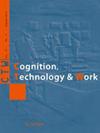Shift work and insulin resistance (HOMA-IR) among professional drivers.
IF 3.4
3区 工程技术
Q2 ENGINEERING, INDUSTRIAL
引用次数: 0
Abstract
BACKGROUND Shift work may be associated with insulin resistance. OBJECTIVE This study aimed to investigate the potential association between shift work and the homeostatic model assessment of insulin resistance (HOMA-IR) index in professional drivers. METHOD A total of four hundred fifty-three professional drivers were invited to participate in the study within a periodic medical examination in the occupational setting. One hundred seventy-seven daytime workers were compared with 175 night shifts and 101 early morning shift drivers. Demographic, occupational, and medical examination including blood pressure, anthropometric data was assessed. Measurement of serum insulin, fasting blood glucose and lipid profile were done for all drivers. RESULTS Compared with day workers, night shift and early morning shift drivers displayed higher levels of HOMA-IR. Metabolic syndrome was found to be significantly increased in night workers. In linear regression analysis, insulin resistance was correlated with shift work independently of demographic and occupational characteristics. CONCLUSION The study revealed that shift work could be a risk factor in developing the risk of metabolic syndrome and insulin resistance. Suggestively, health strategies such as structured lifestyle counseling in occupational health settings are warranted to improve and modify cardiometabolic risk factors.职业司机轮班工作与胰岛素抵抗(HOMA-IR)
轮班工作可能与胰岛素抵抗有关。目的探讨职业司机轮班工作与胰岛素抵抗(HOMA-IR)指数稳态模型评估之间的潜在关联。方法:共邀请453名职业司机在职业设置的定期体检中参加研究。177名白班司机与175名夜班司机和101名早班司机进行了比较。评估了人口统计、职业和医学检查,包括血压、人体测量数据。对所有驾驶员进行血清胰岛素、空腹血糖和血脂检测。结果与白班司机相比,夜班和早班司机的HOMA-IR水平较高。代谢综合征在夜班工人中显著增加。在线性回归分析中,胰岛素抵抗与轮班工作相关,独立于人口统计学和职业特征。结论倒班工作可能是发生代谢综合征和胰岛素抵抗的危险因素。建议,健康策略,如结构化的生活方式咨询,在职业健康设置是必要的,以改善和改变心脏代谢的危险因素。
本文章由计算机程序翻译,如有差异,请以英文原文为准。
求助全文
约1分钟内获得全文
求助全文
来源期刊

Cognition Technology & Work
ENGINEERING, INDUSTRIAL-
CiteScore
6.90
自引率
7.70%
发文量
26
审稿时长
>12 weeks
期刊介绍:
Cognition, Technology & Work focuses on the practical issues of human interaction with technology within the context of work and, in particular, how human cognition affects, and is affected by, work and working conditions.
The aim is to publish research that normally resides on the borderline between people, technology, and organisations. Including how people use information technology, how experience and expertise develop through work, and how incidents and accidents are due to the interaction between individual, technical and organisational factors.
The target is thus the study of people at work from a cognitive systems engineering and socio-technical systems perspective.
The most relevant working contexts of interest to CTW are those where the impact of modern technologies on people at work is particularly important for the users involved as well as for the effects on the environment and plants. Modern society has come to depend on the safe and efficient functioning of a multitude of technological systems as diverse as industrial production, transportation, communication, supply of energy, information and materials, health and finance.
 求助内容:
求助内容: 应助结果提醒方式:
应助结果提醒方式:


